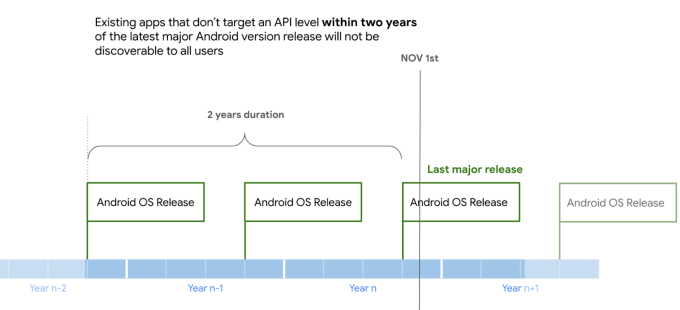Google is preparing to clear its Play Store of outdated apps. The company warned Android app developers that starting on November 1, 2022, it will hide apps and block their installation to users’ devices if developers haven’t kept up with the latest Android OS releases. Specifically, Google said apps that don’t target an Android API within two years of the latest major Android release version will no longer be able to be discovered or installed by new users whose devices run Android OS versions that are higher than the apps’ target API level.
In short, this means that Android users who are keeping up with the latest software or those who’ve just purchased new Android phones will no longer be able to find or download old, out-of-date apps.
This should not be a significant adjustment for any active developers building for Android, as Google already requires new apps and app updates to target an Android API level within one year of the latest major Android OS version release. And any app updates submitted that also don’t meet this requirement can’t be published on Google Play.
But the change would impact fully abandoned apps or those where the developer is still serving their users but no longer keeps up with the latest Android API updates.
Since the apps aren’t entirely removed from Google Play, this won’t be a direct equivalent to the great App Store purges in years past where Apple pulled down tens of thousands of outdated, abandoned apps. In fact, Google explains that the existing users of the older apps impacted by the new policy will still be able to discover them, re-install them, and use them on any Android OS version the app supports. This is perhaps more consumer-friendly than simply yanking apps off the app store, as Apple had done.
However, Google’s goal was similiar to Apple’s in that outdated apps not only offer a poor expeirence they’re also a potential security risk.
As Google explained in its announcement about the new policy, every Android OS update brings “privacy, security, and user experience improvements.”
“Users with the latest devices or those who are fully caught up on Android updates expect to realize the full potential of all the privacy and security protections Android has to offer. Expanding our target level API requirements will protect users from installing older apps that may not have these protections in place,” the company stated.
While there are ongoing issues with Andorid malware, including recenlty those from Russian state-supported actors engaging in espionage, these malicous programs are not always found in outdated apps. Instead, they often prompt the user to allow it to use the high-level permissions it requires, and the user agrees.

Image Credits: Google
Google notes the “vast majority” of Google Play apps already meet the new requirements and won’t be impacted by the policy change. For other apps, this notification serves to allow reputable developers the time to make the necessary updates.
To aid developers in the transition, Google published a technical guide to help migrate apps to the target API levels, along with Help Center documentation which includes the exact timelines for the changes. It’s also offering developers the ability to request a six month extension if they need more time for their migration through a form that will be availalbe in the Play Console later this year.
Google has been working to tighten up its app marketplace in recent days as regulations take closer aim at the mobile app ecosystem. This month, Google Play’s new billing payments policy also went into effect. The company had announced back in 2020 that developers would need to come into compliance with Google’s policy that requires apps selling digital goods and services to use Google Play’s own billing system. Unless developers were approved for an extension, they’re no longer be able to submit app updates until they’re in compliance as of April 1, 2022, barring any critical security issues. On June 1, 2022, non-compliant apps will be removed from Google Play.
Combined with this semi-purge of outdated apps, the Play Store will likely lose many apps in the months to come.
Powered by WPeMatico




